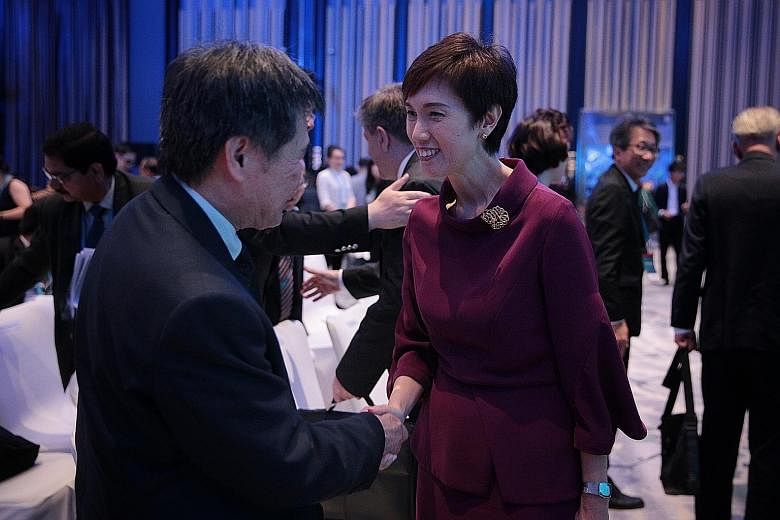A new Asean initiative is in the works to boost the region's ability to prepare for the changing nature of work.
The idea of a Future of Work Regional Initiative was mooted by Singapore and discussed by Asean labour ministers at a conference yesterday.
Manpower Minister Josephine Teo said at the opening of the conference that Singapore believes it will benefit Asean to bring together international experts and regional stakeholders to share and develop the region's capabilities through workshops, seminars and courses.
"We will need a platform for Asean to continuously learn from each other, build capacity and share best practices," she said.
She said her ministry will work with the National Trades Union Congress (NTUC) and Singapore National Employers Federation (SNEF), as well as Asean, the International Labour Organisation (ILO) and other stakeholders to see how to bring the idea to fruition.
For a start, she said, the focus can be on tripartism, workplace safety and health, and embracing technology for inclusive growth.
Mrs Teo and her Asean counterparts signed a joint statement on the future of work, committing to improve education and training standards to harness technology, and to increase the labour force participation of women, people with disabilities, young people and the elderly, among other things.
They will promote fiscally sustainable national social protection initiatives to improve retirement adequacy, and support efforts of employers' and workers' organisations to develop means for collective representation and social dialogue.
"Transformative changes, such as technological advances, demographic transition and the rise of the green economy... offer both opportunities and challenges for workers and businesses in the Asean Community," the statement said.
About 700 international delegates are attending the Singapore Conference on the Future of Work: Embracing Technology; Inclusive Growth, at the Raffles City Convention Centre. The conference, which centres on the Work for a Brighter Future report published by the ILO in January, ends today. It is organised by the ILO, Ministry of Manpower, NTUC and SNEF.
Mrs Teo said workers, businesses and the government must be agile.
For workers, this means being proactive in picking up new skills to stay relevant. For businesses, it means using technology and training to keep pace with industry transformation, improve the quality of jobs and help workers be more productive and empowered, she said.
For the government, it means staying responsive, taking the lead to point out future directions and pitfalls, providing resources and coordinating stakeholders.
Mrs Teo said Singapore recognises the need to support workers' career mobility. It also regularly reviews employment legislation, policies and programmes to ensure adequate and appropriate labour and social protection, an inclusive workforce and progressive workplaces.
Asean remains a place of potential, amid the challenges of demographics, technology and climate change which could disrupt the nature of work, she noted.
"To better serve all our workers, let us face our challenges with a balance of humility and confidence," she said.
"Humility because we will never have all the answers to all the questions about the future; confidence because as humans, we have the capacity to learn and adapt, not just to survive but thrive."
ILO director-general Guy Ryder said in a speech that there is a lot to celebrate in Asean's growth.
He highlighted how in the last century, millions of Asians moved to Europe and North America for work, but now entrepreneurial Europeans and Americans are flocking to Asia, attracted by the region's dynamism.
"Asia has become the heart of digital innovation, and there is that sense of optimism here," he said.
Despite this, innovation does not guarantee decent work or inclusive growth for all, he noted. Last year, one in five workers in Asean was living below the poverty line.
Mr Ryder said the ILO will do everything within its capacity to make the Future of Work Regional Initiative happen.
If governments can work together with employers and working people to find balanced and consensual solutions to challenges, he said, this can open the way to a "reinvigoration of the social contract - this tacit agreement in our societies between people and institutions about what is fair, what is legitimate, what they want from the future of their lives and countries".


